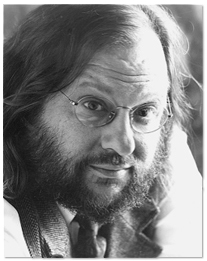Joel Lurie Grishaver
 Because I understand loneliness, I believe in the existence of the human soul. I believe that we are engineered with a need for connection. People aren’t meant to be alone. More than just believing that infants need attention, I believe that all of us need family, community, and a circle of friends. Loneliness is the 60 cycle hum of the human soul turned on and running, but not yet connected. It is the screaming over the phone line—waiting for a modem on the other side to respond.
Because I understand loneliness, I believe in the existence of the human soul. I believe that we are engineered with a need for connection. People aren’t meant to be alone. More than just believing that infants need attention, I believe that all of us need family, community, and a circle of friends. Loneliness is the 60 cycle hum of the human soul turned on and running, but not yet connected. It is the screaming over the phone line—waiting for a modem on the other side to respond.
There are two basic ways of dealing with loneliness without making friends. One is to suffer. The other is to mask the loneliness with business. We try to be too busy to feel, or we try to numb the feeling. At the moment we have two realities. At this stage in the development of technology there seems to be a lot of engagement that can best be described as isolating.
I believe in love letters. Correspondence can develop relationships. The research on social media suggests that social media connections can deepen relationships but have a hard time creating them (see Situated Learning: Legitimate Peripheral Participation by Jean Lave and Etienne Wenger)
AFFILIATION
Here is what I know. Affiliation (and contributions) are trending down. It is as if a guy in a rubber dinosaur suit is crushing a city built of cardboard buildings. Jewish institutions are closing, merging, and downsizing. Jews are staying away in droves. What is easy to witness is the fact that teens are staying away from all youth movements and report that they don’t want cliques (see Current Trends in Jewish Teen Participation with Out-of-School Activities). Show me a teen that doesn’t want to be part of a clique and it is bad news for the Jets and the Sharks. Likewise, boys in particular (who are notorious at being busy playing video games and hacking) are staying away from any Jewish groups.
While we are often complaining that Jewish institutions are not investing enough in technology, ironically this is the technology that creates the business that impedes membership. If the Jewish people are going to fight for their future, technology (positive or negative) is not the issue, community (and affiliation) is.
THE BLAME GAME
We blame the Religious School (and demand that it only be fun) while simply not joining or not attending the synagogue that is the real source of the alienation. It is not only the memory of the synagogue not being fun, of it as a source of boredom, but that as Christopher Lasch in The Culture of Narcissism: American Life in an Age of Diminishing Expectations describes it the new narcissist keeps far away from any involvements that might limit his freedom and mobility. And, yes, I am suggesting that those lost in the reflection of the ipad screen and worship at the idol of the latest and the coolest are narcissist.
I want it clear; I am not blaming the technology, though it tends to inflict dopamine addiction, but the context in which it is place. I am not blaming the victims of boredom, though I am saddened by their response. I am concerned about the Jewish community’s and the Jewish educational communities’ response to non-involvement in that they have forgotten that our greatest gift is the ability to end loneliness. Community—not reinforced individuality—is our best sell. We need not go into the ontology of “freedom” here. It is enough to say that belonging and feeling connected does not limit free will.
We need to listen through the apparent selfishness and consumerism of the current generations and understand that they are masking their loneliness with a great new business.
OUR BEST TRUTH
We should be on facebook and twitter. We need apps and websites, and we have to make peace with technology and those who use it. But our strongest sell needs to be, “We can end loneliness.” Our schools are a place of friendships. Our communities are accepting, supportive, and welcoming. Where those things are not true—we must make them true.
Ron Wolfson latest hit (after “welcoming”) will be Relational Judaism. He is right and his book will be the next great “The Jewish Book.” It is well deserved.
In the same way, Gila Gevirtz’s new Experiencing Sacred Community should be the new standard for Jewish education. To build a shining Jewish future—we need a round table—we need a communal Judaism.
Rather than thinking of this moment as a beginning of decline—or even a radical call for innovation (though that is never bad) think of it as a moment where the loneliness and need that will build the future is fermenting. While bells and whistles can mask loneliness, they can never solve it. The need for human contact will give us a future.
Skype may be a foreshadowing of teleportation. Texting certainly has replaced the quill. But remember “we need one another…” because “no man is a keyboard.”

